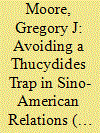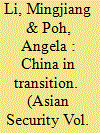| Srl | Item |
| 1 |
ID:
152930


|
|
|
|
|
| Summary/Abstract |
In 2015, Harvard’s Graham Allison wrote an evocative article discussing the “Thucydides Trap” in relations between China and the United States, highlighting the danger of war between a rising power and a reigning power in the international system. Can China and the United States avoid the Thucydides Trap as China rises? This analysis identifies and analyzes seven reasons China and the US might not be able to avoid the trap: the bilateral strategic trust deficit, lack of agreement on the nature of the US pivot, recent trends in China’s maritime policies, disagreements over cyber security, security dynamics underlying China’s Anti-Access/Area Denial and Washington’s AirSea Battle strategies, recent trends in Sino-Russian strategic alignment, and Washington’s concerns about China’s increased defense spending.
|
|
|
|
|
|
|
|
|
|
|
|
|
|
|
|
| 2 |
ID:
152933


|
|
|
|
|
| Summary/Abstract |
This article explains the shift in China’s behavior in the South China Sea between two periods: the first from 2000–2008 and the second from 2008–2014. It analyzes China’s behavior as a dependent variable of the shifting power structures of the Asia-Pacific region, arguing that a shift in regional economic structure and in attitudes toward the use of naval power, combined with the U.S. pivot to Asia and the feedback loop China’s behavior causes, have together been responsible for China’s increased assertiveness in the South China Sea. This analysis forms a part of the complex tangle of motives, actions and counter-actions by all parties in the South China Sea, and allows us a more nuanced understanding of China’s motives than the headlines would offer.
|
|
|
|
|
|
|
|
|
|
|
|
|
|
|
|
| 3 |
ID:
152931


|
|
|
|
|
| Summary/Abstract |
Some scholars believe that as China’s power grows more preponderant, it will leverage its growing might to impose its will on others in the international system. This article engages this debate by probing China’s relationship with small states, going beyond those in its region. Small states are particularly apposite because their size and power deficiencies suggest they are among the most vulnerable to pressure or coercion from big powers such as China. Beijing’s diplomacy towards small states, therefore, represents a barometer of Chinese restraint and exercise of its power in a situation of clear power superiority. The article studies this dynamic, unpacking the contours and shape of China’s relations with small states, as well as the narratives and rationales that drive this relationship.
|
|
|
|
|
|
|
|
|
|
|
|
|
|
|
|
| 4 |
ID:
152929


|
|
|
|
|
| Summary/Abstract |
Has China under Xi Jinping bid an official farewell to Deng Xiaoping’s “lying low” international strategy (taoguang yanghui) in pursuit of a more ambitious foreign policy agenda? In this article, we contend that Xi’s foreign policy is indeed beginning to show signs of departure from that of his predecessors. Beijing has displayed intentions to gradually create new rules in international politics and reform major international institutions to better suit Chinese interests. However, Chinese foreign policy in the first term of Xi’s administration has remained in a transitory phase. Continued domestic preoccupations, China’s lack of experience in undertaking more international responsibilities, as well as conflicting economic and security imperatives in China’s neighborhood have constrained the Chinese leadership’s ability to completely abandon its “lying low” international strategy.
|
|
|
|
|
|
|
|
|
|
|
|
|
|
|
|
| 5 |
ID:
152932


|
|
|
|
|
| Summary/Abstract |
This article outlines how ICT and cyber-related issues have grown in importance in relation to China’s strategic objectives including its economic, military and political interests. The article considers a number of recent policy developments and changing institutional structures in the country. It further highlights the role of the military and its cyber-related initiatives, plus how this might impact international stability. The import of internal stability concerns that thus impacts policies in the cyber field is especially emphasised. The article then considers United States-China relations as they relate to economic security developments in the field. Finally, in highlighting some key matters related to international governance, international law and international cooperation, the articles surmises that it is likely that issues related to sovereignty and information control will be rather difficult to surmount in the near future.
|
|
|
|
|
|
|
|
|
|
|
|
|
|
|
|